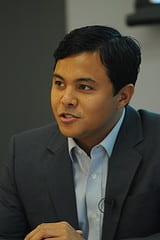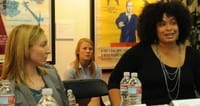 From technology’s impact on public diplomacy to the role of biography in constructing presidential legacy, the USC Annenberg Center on Communication Leadership & Policy‘s (CCLP) diverse range of research projects and policy initiatives on display at the April 13th Policy Research Roundtable. Convened by CCLP Director Geoffrey Cowan and hosted by CCLP Research Director Mark Latonero (pictured left), the lunchtime event served as an opportunity for the Center to spotlight its key areas of engagement.
From technology’s impact on public diplomacy to the role of biography in constructing presidential legacy, the USC Annenberg Center on Communication Leadership & Policy‘s (CCLP) diverse range of research projects and policy initiatives on display at the April 13th Policy Research Roundtable. Convened by CCLP Director Geoffrey Cowan and hosted by CCLP Research Director Mark Latonero (pictured left), the lunchtime event served as an opportunity for the Center to spotlight its key areas of engagement.
“We believe that we have an obligation to produce research that makes a difference,” Cowan explained to the standing-room only crowd, which included CCLP Fellows Morley Winograd, Narda Zacchino, and Jack Lerner. “This roundtable is our opportunity to share with USC students and faculty our ongoing efforts to produce communication research that shapes public policy.”
 Photo credit: Dan Avila
Photo credit: Dan AvilaOne of CCLP’s main initiatives featured at Wednesday’s event was its research into technology and social change, specifically in the area of human trafficking. Latonero, who is spearheading the Center’s human trafficking initiative, also oversees a team of graduate researchers, who are compiling evidence of trafficking from social networking sites. CCLP Research Associates Erin Kamler (below, left), an Annenberg doctoral student; and Zhaleh Boyd (below, right), an Annenberg Public Diplomacy masters candidate and 2010 Thomas R. Pickering Graduate Foreign Affairs Fellow, were on hand to describe a key element of the Trafficking in Persons Project–their research trips to Thailand, Cambodia, and Vietnam.
 Photo credit: Dan Avila
Photo credit: Dan Avila“Our Center makes it a priority to actively involve both undergraduate and graduate students in our research projects,” explained Latonero, who led the discussion. “It’s a great opportunity for students to learn how to conduct empirical research, while also spending time in the field to connect the academic realm with the practical world.”
The roundtable also featured the recent work of CCLP Senior Fellow Jeremy Curtin, who shared highlights from his newly released report, Forging a 21st Century Diplomatic Service for the United States Through Professional Education and Training. The paper, which was jointly sponsored by CCLP, the American Academy of Diplomacy, and the Stimson Center in Washington, DC, recommends better training and increased funding for the country’s public diplomacy officers.
“New information technology is changing our public diplomacy in an increasingly networked world,” explained Curtin. “The fundamental requirements of diplomacy remain the same, but we need to know more about more things.”
 Photo credit: Dan Avila
Photo credit: Dan AvilaOther research projects presented at the roundtable included executive-in-residence Jeffrey S. Klein‘s (pictured left) work on Online Community News: A Case Study and Senior Fellow Richard Reeves work on the construction of Ronald Reagan’s legacy. Reeves, who was routinely critical of Reagan’s politics when he covered the president for New York Magazine, argued that social and fiscal conservatives have been largely successful in reframing Reagan’s record as they construct the presidential legacy for the 40th President.
“Years ago, I wrote that Ronald Reagan was the nucleus holding together all of the different factions of the Republican Party,” Reeves said. “I assumed that the whole spinning apparatus would implode, when the nucleus, Reagan, was removed. I was wrong.”
To learn more about CCLP’s research projects, click on the links below:
Communication Technology & Social Change
Trafficking in Persons (TIP)
21st Century Diplomacy
Forging a 21st Century Diplomatic Service for the United States Through Professional Education and Training ![]() . Lead drafter, Jeremy Curtin
. Lead drafter, Jeremy Curtin
Journalism entrepreneurship on the hyperlocal level – a case study in community news [blog post]
Online Community News: A Case Study in Long Beach, California ![]() by Jeffrey S. Klein & María J. Vázquez
by Jeffrey S. Klein & María J. Vázquez
The Ronald Reagan Centennial Academic Symposium
The Last Campaign: Legacy of Reagan ![]() by Richard Reeves
by Richard Reeves